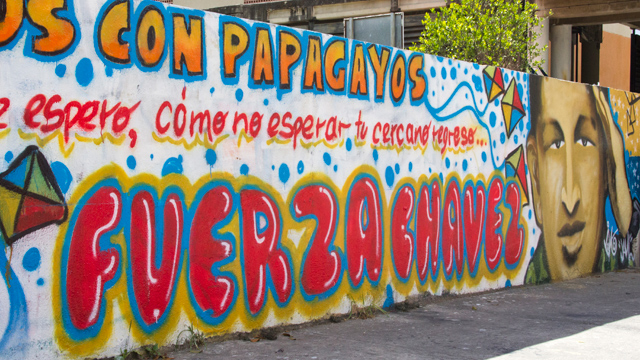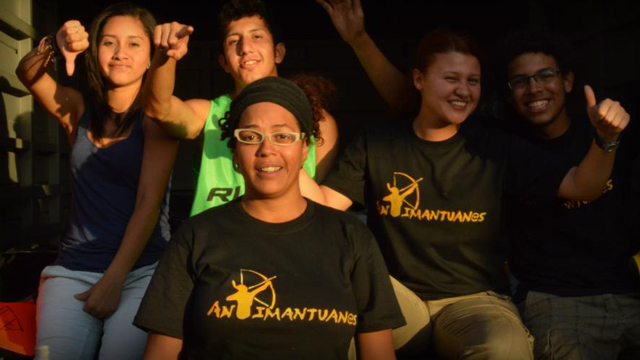Young Chavez Supporters Contemplate a Post-Chavez Venezuela
4 out of 10 Venezuelan voters are aged 18-35.
Jan. 8, 2013— -- News have been grim in Venezuela regarding Hugo Chávez's health, with Communication Minister Ernesto Villegas declaring on January 3rd that the socialist president was suffering from a "severe lung infection" from complications sustained during his most recent cancer-related surgery in Cuba.
But two days later, Chavista politicians had something to be hopeful for. Thousands of people showed up in front of the National Assembly in Caracas to express their support for the Venezuelan leader, his Bolivarian revolution and Diosdado Cabello, a key Chávez ally who has been re-elected to the post of National Assembly President.
Among the crowd, left-wing youth groups like Colectivo La Piedrita displayed banners and made their modest motorcycles roar. Alfredo Gonzalez, a member of La Piedrita, said that he would support the revolution no matter who was at the helm.
"We are here to fight imperialism," Gonzalez said on Saturday, as he directed his fellow activists towards a stage set up outside Venezuela's National Assembly building. "The people have already decided which road to take."
La Piedrita is one of the most radical Chavista collectives in Caracas. Members carry weapons in support of the revolution, and on several occassions have protested in front of opposition-leaning TV station Globovision, initmidating its employees, by throwing tear gas canisters at the buidling.
But Gonzalez's reaction to Chavez's ailing health condition is not too different from that of mainstream Chavistas, who say that the revolution must continue while the president "recovers." Like many of his comrades, Gonzalez dismissed information circulating online, which says that Chávez may be in a coma and at death's doorstep, breathing only with the help of a respiration machine. "Those are inventions of imperialists, who want to destabilize the country," he claimed.
Chávez's real health condition is somewhat of a mystery, with the government providing few details. There is still a possibility that he may return to office and run Venezuela for another six years.
But young supporters of President Chávez are also aware that the charismatic leader could pass away soon. And his imminent death raises uncertainty about the country's future.
"With his leadership, the president guarantees the stability of the country," said Jesús Garcia, a 22 year-old member of the Anti-Mantuanos Chavista collective. Garcia said that if Chávez lives, but is too sick to be the country's president, he should stay on as a "guide" of the revolution, because "there is much work to be done."
 A mural in Caracas wishes Chavez strength as he battles cancer in a Cuban hospital
A mural in Caracas wishes Chavez strength as he battles cancer in a Cuban hospital
If Chávez dies, elections are supposed to take place within 30 days. And in this scenario, the support of young activists like Garcia could turn out to be crucial for Vice President Nicolás Maduro, or whoever is selected as the government´s next presidential candidate.
In the last presidential election, which pitted President Chávez against opposition candidate Henrique Capriles, young Venezuelans volunteered in large numbers for both candidates. They helped to raise funds and led publicity campaigns, aimed at making candidates more appealing to young voters. Pollsters in Venezuela estimate that 40 percent of the country's elegible voters are aged 18 to 35.
Youth groups, financed by the government in varying degrees, also play an important role in between elections.
In the populous and poor barrios of Caracas, groups like Anti-Mantuanos organize soccer tournaments and concerts, and teach kids graffiti and other kinds of street art, giving at-risk youth a way to express themselves, something to belong to and also something to do with their free time.
But these groups also introduce youth to the ideals of Chávez's socialist revolution by providing ideologically charged lessons on Venezuelan national heroes, and Venezuelan history.
Many Chavista youth groups have politically charged names like "Ola Bolivariana," the Bolivarian wave, or Anti-Mantuanos, which loosely translates to "Anti-oligarchy."
Garcia says that with all its extracurricular activities, Anti-Mantuanos, "saved" him from a life of crime in the streets. He says his gratitude to the revolution is so large, that he would instantly back the next Chavista presidential candidate, and support him however he could.
But amongst some young Chavistas there is less faith in the future. Adriana Rivas, a self-described "youth revolutionary leader," who is also from the neighborhood of Altagracia, worries that without Chávez socialism will not progress in Venezuela.
"I don't trust in the deepening of the revolutionary process if Chávez dies," Rivas told ABC-Univison. Rivas said that if Chávez is not healthy enough to be president but continues to live, he should serve as an adviser to his hand-picked successor, Maduro. "[Vice President] Nicolás Maduro is a soldier who does what he is told to do," Rivas opined. "So with that sort of set-up, we could advance."
 Adriana Rivas, in white glasses, poses with members of the Antimantuanos youth collective
Adriana Rivas, in white glasses, poses with members of the Antimantuanos youth collective
Rivas' greatest fear is that if Chávez dies, Venezuela's Socialist Party will go the same route as Mexico's longtime ruling party, the Institutional Revolutionary Party (PRI).
Created in 1929 by Mexican President Plutarco Elias Calles, the PRI initially backed statist economic policies, like the nationalization of Mexico's oil industry. It created labor unions and negotiated wage increases for Mexican laborers.
Now, the PRI, which regained the presidency with Enrique Peña Nieto last year, backs labor laws that decrease workers' benefits and make it easier to hire and fire employees. PRI legislators are also contemplating ways in which to increase private sector participation in Mexico's oil industry.
Mexico now has leftist parties that oppose the PRI. But Rivas thinks they are not radical enough.
"People in Venezuela will continue to vote for the left, there's no turning back here," Rivas claimed. "But the problem is that Venezuela can become like Mexico, where parties that claim to be left wing, are no such thing at all."